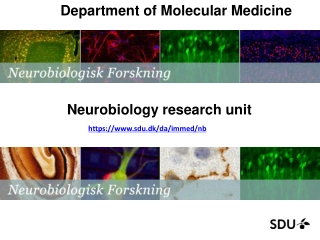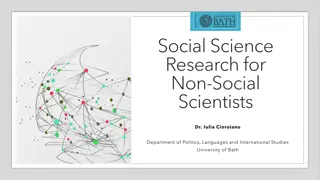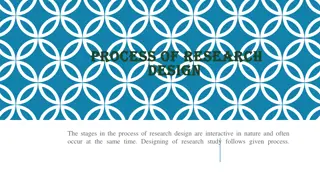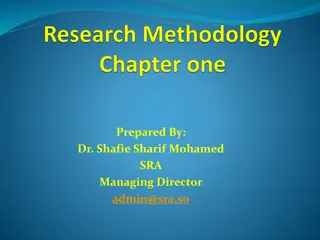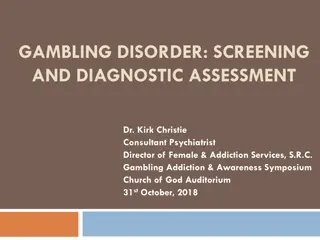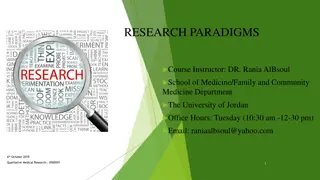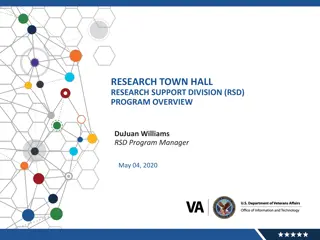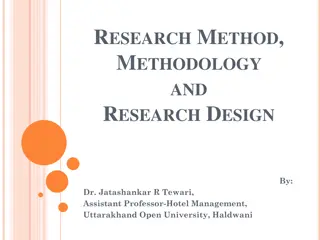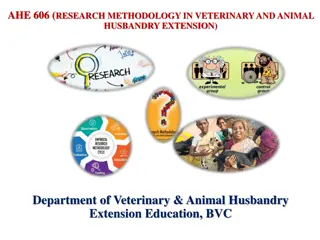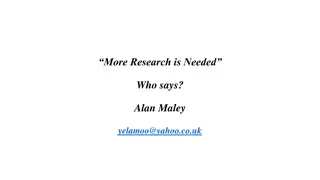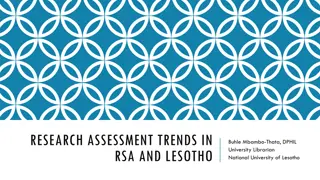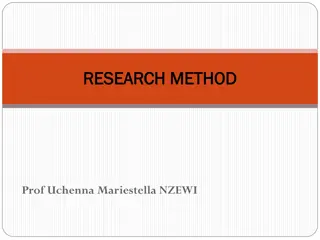Neurobiology research unit
The Department of Molecular Medicine's Neurobiology research unit focuses on improving the understanding of the central nervous system's response to injury and disease, including multiple sclerosis, Alzheimer's disease, Parkinson's disease, and stroke. They utilize molecular, cellular, and histologi
0 views • 15 slides
Addressing Contemporary Challenges in Research Security Program Development
The Workshop to Inform Development of the Research on Research Security Program (RRSP) focuses on safeguarding the research enterprise amidst evolving global threats. Led by Dr. Rebecca Keiser and Dr. Shawna Cox, the program aims to balance security measures while maintaining an open and collaborati
3 views • 16 slides
Understanding Trauma's Impact on the Brain: A Comprehensive Overview.
This content delves into the neurobiology of trauma, exploring how different brain systems are affected by traumatic experiences. It covers topics such as amygdala hijack, coping skills, and the Polyvagal Theory. A survivor's experience is shared to provide insight into the real impact of trauma on
2 views • 29 slides
Safeguarding Canada's Research: Policy on Sensitive Technology Research and Affiliations of Concern (STRAC)
Canada's new Policy on Sensitive Technology Research and Affiliations of Concern (STRAC) aims to protect the country's research ecosystem from foreign entities posing security risks. The policy restricts funding for projects involving sensitive technology research if affiliated with military or stat
1 views • 10 slides
Understanding the Process and Types of Research Design
The process of research design involves interactive stages that occur simultaneously, leading to the designing of a research study. This includes steps in research design, classification of research design types, such as exploratory, descriptive, and experimental/causal research design. Each type se
12 views • 8 slides
Importance of Formulating Clear Research Problems
Addressing a research problem is crucial in research endeavors as it guides the process, helps in setting objectives, and determines the direction of the study. Formulating a well-defined research problem aids in understanding the research procedure, clarifying objectives, designing the research pro
14 views • 7 slides
Action Research Cycle Step 1: Plan and Implementing Research Questions
Action research involves identifying a problem, forming research questions, and creating a research plan. It aims to understand situations, evaluate, problem-solve, and generate new ideas. Defining a research topic is crucial, focusing on the rationale and relevance. Selecting manageable topics dire
8 views • 17 slides
UCC Research Support and Strategies Overview
UCC's Research Support, Policy & Strategy function, led by David O'Connell, PhD, provides comprehensive support for research activities at the university. The office manages research funding, monitors performance, and facilitates engagement with external stakeholders. UCC's involvement in Horizon Eu
3 views • 17 slides
Understanding Social Science Research for Non-Social Scientists at University of Bath
This resource delves into social science research fundamentals, encompassing types of inquiry, empirical research categories, primary and secondary research distinctions, and the importance of selecting a suitable research topic. It offers guidance on initiating research based on empirical observati
1 views • 10 slides
Graduate Student Orientation Fall 2021 - CS Department Overview
The Graduate Student Orientation for Fall 2021 at the CS Department led by Dr. Scott Fleming covers essential topics such as department mission, degree programs, faculty research areas, research impact indicators, and research opportunities within the department. Learn about the CS Department's high
0 views • 41 slides
Enhancing Research Skills with Epigeum's Research Skills Toolkit
Epigeum, a leading provider of online courseware, offers the Research Skills Toolkit, comprising five core programs designed to equip postgraduate researchers with key skills and knowledge. Developed from the Research Skills Master Programme, the Toolkit integrates interactive learning design, user-
1 views • 9 slides
Effective Proposal Writing for Health Research
Learn about the fundamentals of research proposals for health-related studies, including defining research, understanding the purposes of health research, and exploring motivation for undertaking research. Discover the difference between basic and applied research, examine types of research, and del
1 views • 70 slides
Overview of Research Problem Identification and Formulation
Understanding the importance of defining a research problem, this content delves into the selection and formulation of research problems, the definition of a research problem, reasons for defining it, methods for identifying research problems, sources of research problems, and considerations in sele
1 views • 11 slides
Understanding the Process and Types of Research Design
The process of research design involves interactive stages occurring simultaneously, leading to the creation of a structured study. There are three main types of research design: exploratory, descriptive, and experimental (or causal). Each type has its own objectives and methods. Exploratory researc
0 views • 7 slides
Understanding Research Aims, Objectives, and Hypothesis in Health Research
This content delves into the importance of defining research aims, objectives, and hypotheses in health research. It explains how research aims clarify the study's goals, objectives outline specific tasks to achieve those goals, and hypotheses help in making predictions. It also discusses the proces
1 views • 17 slides
Understanding the Essence of Research: A Comprehensive Overview
Research is a systematic pursuit of new knowledge, aiming to unveil hidden truths through data collection and analysis. This course outline delves into the fundamentals of research, covering topics such as types of research studies, importance of research, and distinctions between pure and applied r
3 views • 32 slides
Epic Tools for Clinical Research by Shara Power, RN, BSN, OCN
Explore Epic tools for clinical research developed by Shara Power, a skilled application developer specializing in EPIC Beacon Oncology at UIHC Healthcare Information Systems. Learn about managing research study records, investigational study medication orders, and the process for creating and using
0 views • 26 slides
Understanding Gambling Disorder: Screening and Diagnostic Assessment
Dr. Kirk Christie, a Consultant Psychiatrist, delves into the world of gambling disorder, exploring definitions, neurobiology of addiction, screening instruments, DSM-V criteria, and harmful alcohol usage. Discover the differences between nondisordered, social, and problematic gambling behaviors, al
0 views • 27 slides
Understanding Research Paradigms in Qualitative Medical Research
Delve into the world of research paradigms in qualitative medical research with a focus on the key differences between objective and subjective research, the meaning of research paradigms, components of research paradigms, types of research paradigms, and how paradigms guide the selection of researc
0 views • 42 slides
Overview of VA Research Support Division Program
The Research Support Division (RSD) program at the VA focuses on providing guidance and implementing enterprise information security standards for stakeholders involved in research programs. Their mission includes ensuring data security, risk management, and transparency while advancing VA Research.
2 views • 16 slides
Introduction to Dynamic Structural Equation Modeling for Intensive Longitudinal Data
Dynamic Structural Equation Modeling (DSEM) is a powerful analytical tool used to analyze intensive longitudinal data, combining multilevel modeling, time series modeling, structural equation modeling, and time-varying effects modeling. By modeling correlations and changes over time at both individu
0 views • 22 slides
Understanding Research Methods and Methodology in Hotel Management
Research in hotel management involves a structured process of inquiry to collect, analyze, and present information on various topics. The research process typically consists of steps like posing a question, collecting data, and presenting answers. Researchers follow a scientific method to identify p
0 views • 22 slides
Guidelines for Selecting Research Project Topics in Environmental Health
Research is crucial for addressing environmental health issues. Choosing a good research topic is the first step towards effective research. This paper discusses the meaning, characteristics, types of research, and the research process to help in selecting appropriate research topics. Understanding
0 views • 15 slides
Comprehensive Research Training Programme in Social Sciences
Delve into the Research Training Programme offered by the Graduate School of Social Sciences, led by Professor Mark Tranmer. Explore the importance of research methods training, course offerings under the Research Training Programme (RTP), the Certificate in Social Science Research Methods (CSSRM),
6 views • 11 slides
Understanding Research Methodology in Veterinary and Animal Husbandry Extension
Delve into the concept, nature, and scope of research in social sciences within the context of veterinary and animal husbandry extension. Explore types of research, variables, problem formulation, hypothesis testing, and the importance of research in generating new knowledge. Discover the process of
0 views • 15 slides
Sustainable & Resilient Research Enterprise Series
Join the COR Summer Meeting Series for insights on sustaining research amidst COVID-19 and beyond. Discover key topics like managing international research, eradicating sexual harassment, public impact research, and the future of university research. Share your stories of Public Impact Research on C
0 views • 19 slides
Icelandic Research Fund 2015: Enhancing Scientific Research and Education
The Icelandic Research Fund (IRF) aims to enhance scientific research and education in Iceland by awarding funding to research projects led by individuals, teams, universities, research institutes, and companies. Principal investigators must have completed graduate studies and experience in running
0 views • 22 slides
Understanding the Three Major Stages in Legal Research Process
Legal research involves a systematic three-stage process: research planning, research implementation, and presenting research findings. Each stage requires different skills and tasks, such as fact collection, legal analysis, problem identification, data analysis, and interpretation. The process incl
0 views • 36 slides
Importance of Research Report Writing in Academic Studies
A research report is a systematic, well-organized document that defines and analyzes a subject or problem. It is crucial for sharing findings, recommendations, and conclusions of a research project. Research report writing is essential in completing research tasks effectively and ensuring that the p
0 views • 23 slides
Challenges in Self-Help Research in Germany
Exploring the landscape of self-help research in Germany reveals various challenges and obstacles faced by researchers in studying self-help initiatives. The research delves into different aspects such as research scope, involvement of various groups, and the entities conducting research in this dom
0 views • 14 slides
Memorial University Research Strategies Overview
Memorial University's research strategies focus on attracting, retaining, and supporting researchers, fostering an environment of research excellence, engaging with community partners, and supporting fundamental and applied research. The university's strategic priorities include synergy in applicati
0 views • 11 slides
Problems with the Perception of Research in Language Teaching
Research in language teaching is often given unjustifiable status, serving the interests of research communities rather than teachers. While some research is valuable, there are issues with relevance, accessibility, and applicability, leading to a disconnect between research and teaching priorities.
0 views • 24 slides
Exploring UCL's Digital Research Initiatives and Community Engagement
Uncover the significance of digital research at University College London (UCL) through the UCL Festival of Digital Research & Scholarship chaired by Allison Littlejohn. Learn how UCL is facilitating digital research, enabling innovation, and fostering a collaborative research environment. Discover
0 views • 13 slides
Shunda Creek Wilderness Addiction Treatment for Young Men
Shunda Creek offers a 90-day residential and wilderness-based addiction treatment program for young men aged 18-24. The program, known as The Shunda Journey, focuses on five phases including engagement, acceptance, community, courage, wilderness/adventure, compassion, relationship, and commitment. I
0 views • 9 slides
Understanding Trauma: Key Elements and Neurobiological Impact
Trauma-informed practice involves being aware of trauma's presence, understanding its effects on physical and emotional well-being, and working with trauma symptoms constructively. Trauma can arise from direct exposure, witnessing, or indirect experiences, affecting memory encoding and retrieval. Th
0 views • 23 slides
Automatic Extraction Model of Thesis Research Conclusion Sentences
Full-text academic literature contains rich data that can be analyzed using machine learning techniques. This research focuses on extracting thesis research conclusion sentences automatically to enhance summarization processes. The study involves data processing, annotation, and creating discriminan
0 views • 9 slides
Research Assessment Trends in RSA and Lesotho: Issues, Challenges, and Forward Strategies
Research assessment in RSA and Lesotho involves evaluating research quality, measuring inputs, outputs, and impacts using both qualitative and quantitative methodologies. The prevailing practices include assessing research productivity for progression and utilizing various assessment mechanisms to e
0 views • 7 slides
Understanding Research Methods and Methodology in Academic Projects
Feeling confused or frightened about starting a research project is common, but this presentation by Prof. Uchenna Mariestella Nzewi aims to help you understand the importance of research, plan your project, and start writing effectively. Research is an organized and systematic way of finding answer
0 views • 50 slides
Exploring Research Design and Funding Priorities in Northern Ireland
Dive into the world of research at the upcoming Application and Research Design Workshop scheduled for Friday, 28th May 2021. Discover the strategic priorities driving impactful research initiatives, learn about current research projects, funding processes, and collaborations. Explore the rich histo
0 views • 37 slides
Writing Research Papers Effectively: Guidelines and Steps
Effective writing for research involves developing a good research idea, writing a literature review, and understanding the key elements of writing research articles. This process includes coming up with a strong research question, gathering relevant information, creating an outline, writing the dra
0 views • 26 slides
